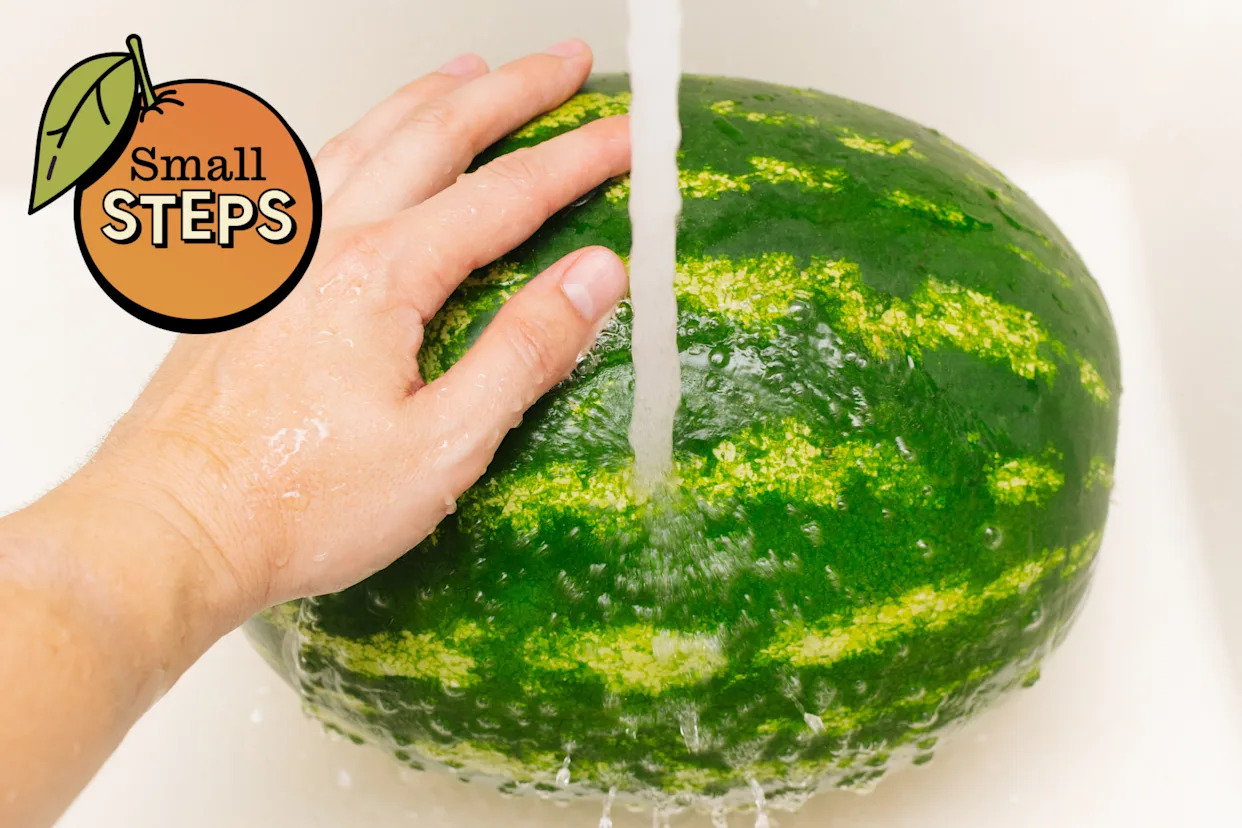Wash your watermelon, do this airport exercise and set your AC to this temperature — plus 10 more health tips to help you have a great week

Hello Yahoo readers! My name is Kaitlin Reilly and I am here to share the best tips from around the internet.
This week, much of the United States saw a major heat wave, thanks to a heat dome that sent temperatures soaring above 100°F in cities including Washington, D.C., Baltimore, Philadelphia and New York. While much of the heat has since dissipated, summers are getting hotter overall — which means it’s important you know how to protect yourself from extreme heat.
The best thing you can do when temperatures soar? Stay indoors and keep as cool as possible, whether that’s chilling at home with your AC on or seeking refuge at your local mall or multiplex. (Now is not the time to play pickleball on a scorching court!) If you must be outside, stick to the shade as much as possible, stay hydrated and wear a big hat, sunglasses and loose, UV-protective clothing — not to mention sunscreen!
AdvertisementAdvertisement#«R24ekkr8lb2m7nfblbH1» iframe AdvertisementAdvertisement#«R44ekkr8lb2m7nfblbH1» iframeMost important, know the signs of heat-related illness: If you’re experiencing dizziness, headache, nausea, rapid heartbeat, confusion, muscle cramps and hot, dry or excessively sweaty skin, get somewhere cool and shady. Call 911 if vomiting, confusion or a loss of consciousness occurs.
Want to see how hot things will get for your area this week? Check out your local weather forecast — and peek your horoscope too, if you’re so inclined. Then read about the small steps you can take to make your week its healthiest, happiest yet.
🍉 Wash your watermelon
Watermelon is a July 4 staple. And while the thought of hauling a heavy melon into your sink sounds super-annoying, you should be giving that baby a thorough wash before you slice into it. Food safety expert Darin Detwiler tells Self that washing watermelons before eating them is “critical.” That’s because the fruit grows on the ground, which means they’re exposed to lots of contaminants. (Think dirt and even animal manure … gross.) Meanwhile, transport, storing and handling can expose your melon to other bacteria that can make you sick.
To clean your watermelon, rinse it under cool water in the sink, then scrub it all over with a clean brush. Skip soap or bleach. Finally, make sure that your knife and cutting surface are also clean, so there’s no germy cross-contamination. Happy slicing!
✈️ Get to the airport a little earlier — to work out
Want stress-free travel this Fourth of July weekend? Get to the airport a little earlier than usual this year. Thanks to Real ID changes, lines at security are expected to be longer than is typical for this busy holiday, Good Morning America reports. And if you happen to breeze through and have time to kill, use those long hallways to get some steps in before your flight (and the forced sedentary time that comes with it). Men’s Fitness recommends using your preflight terminal time to do a one-arm farmer’s carry: Walk while holding your suitcase in one hand, then swap sides.
🌡️ Adjust your thermostat
Listen, we know there’s a lot of debate about how to set the thermostat. One person’s too hot is another person’s just right, and in this heat, it’s hard to resist the temptation to crank up the air conditioner at full blast. What the U.S. Environmental Protection Agency’s Energy Star program recommends to keep inhabitants comfortable and keep cooling costs low is to set the thermostat to 78 degrees when you wake up, USA Today reports. And since temps drop at night, you can get away with setting it four degrees warmer (about 82 degrees) in the evening. Away from home? Go for 85 degrees instead to maximize efficiency.
AdvertisementAdvertisement#«R2fekkr8lb2m7nfblbH1» iframe AdvertisementAdvertisement#«R4fekkr8lb2m7nfblbH1» iframeIf you’re thinking, “I would melt in that temperature,” try these cooling tricks before resorting to adjusting the thermostat: Use curtains to block heat, seal air leaks, limit oven use and turn on fans to help circulate air.
🧹 Try this 5-minute cleaning routine
Anna Louisa, a cleaning influencer with over 4 million followers, has a simple hack for getting into the habit of tidying up your home: "Pick one spot, set a timer for five minutes and just start,” she tells Women’s Health. “No pressure to finish the whole room — just do what you can in that window.” Why does it work? The content creator says that doing just five minutes stops you from feeling overwhelmed by the never-ending task of cleaning. And you can repeat those five minutes as many times as you wish. Eventually, you’ll strengthen the tidying-up habit, which can keep your space feeling fresh.
🤧 Practice good cold etiquette
People may associate colds with chillier weather, but it’s possible to catch one in the summer months, too, USA Today reminds us this week. If you’re struggling with symptoms like a stuffy nose, sneezing, coughing and fatigue, make sure you give your body plenty of R&R — yes, even if that means skipping a barbecue. Not only is rest the key to recovering, but you’ll also avoid spreading germs to others. Alison Mitzner, a pediatrician, tells the outlet that “being in shared spaces often increases the likelihood of transmission,” adding that with a cold you’re “usually contagious for as long as you have symptoms, which typically last seven to 10 days.” Skip the summer fun (for now) and focus on rest, plus nasal rinses and anti-inflammatory medication like ibuprofen when appropriate.
🧀 Pick high-protein cheese
Cheese may get a bad rap due to its higher saturated fat content, but it also contains important nutrients like calcium and B12, on top of being a good source of protein (something everyone seems to be wanting more of these days). “The firmer and more aged the cheese, the higher the protein,” dietitian Kristen Lorenz tells Delish. Mozzarella, cottage cheese and ricotta are other solid options; choose a low-fat or skim version for the lowest fat-to-protein ratio. And if you’re lactose intolerant, it’s worth considering that aged cheeses like Parmesan, Swiss and cheddar are "naturally lower in lactose,” according to Lorenz.
😌 Practice patience
Becoming more patient “involves building emotional skills like being able to sit with feelings of boredom, frustration and anxiety, along with mindfulness and self-compassion,” psychologist Geoffrey Gold tells Self. One way to do so is by slowing down when things get hectic. Finding moments to simply “be” can train your brain not to expect action 24/7, leaving you calmer overall. Get away from your phone, sit quietly with your thoughts and take some deep breaths. If you need something else to distract you from grumbling with impatience (like, say, when you’re on a frustrating customer service call) try squeezing a stress ball, using a fidget spinner or even sucking on an ice cube.
☕ Reconsider your coffee on a hot day
Dealing with a heat wave? You might want to give coffee (yes, even an iced one) a miss. That’s because the caffeine content of coffee can trigger a diuretic effect, increasing urination and reducing vital body fluids. If those fluids aren’t replaced sufficiently, then “people may become ill or more at-risk of developing a heat-related illness," Dr. Donald Grant tells Yahoo U.K.
🍓 Stock up on anti-inflammatory foods
The produce that’s in season this summer is also great for reducing inflammation, according to our friends at EatingWell. Inflammation is our body’s response to injury and infection, but when our body overdoes it, it can lead to health issues like heart disease. So, while shopping for the freshest picks at the grocery store or farmer’s market, go for strawberries, okra and plums — not only will they help reduce inflammation, they’re also tastiest this time of year. Win-win!
🥑 Store your avocados the right way
Avocados are excellent for you, packed with fiber, healthy fats and vitamins C and E. Unfortunately, figuring out how to keep them perfectly ripe is a constant struggle. According to Simply Recipes, it all depends on timing. If your avocados are still firm and green, leave them on the counter for a few days — but once they’re ripe, pop them in the fridge to slow things down. And if you eat only half (couldn’t be me), rub the exposed green part with lemon or lime juice and wrap it tight with plastic wrap. Just skip those social media hacks telling you to store your avocado in water, which may allow “residual human pathogens like listeria or salmonella on the fruit’s exterior to multiply when submerged in water,” Gina Widjaja of the Hass Avocado Board warns. You definitely don’t want your guac to put you at risk of food-borne illness.
😴 Recover from a bad night of sleep
There’s nothing more frustrating than a night of tossing and turning, whether that’s due to a baby’s teething or work stress you can’t stop thinking about. The good news is that you can bounce back, experts tell Women’s Health. Rebecca Robbins, assistant professor of medicine at Harvard Medical School, suggests aiming for a 20-minute daytime snooze to repay your so-called sleep debt after a poor night’s sleep — and if you pulled an all-nighter, a 90-minute nap is even better. Can’t sleep? The next best thing is to “walk outside in the natural sunlight,” which gives an energy boost similar to caffeine. And get moving: Exercise helps your body produce the sleep-encouraging hormone melatonin, in addition to lowering stress.
🧼 Go easy on that disinfecting wipe
We get it: It’s easy to use a disinfecting wipe to clean as much stuff as possible. But cleaning experts tell the Spruce it’s a bad idea to wipe everything blindly, as many wipes contain harsh chemicals (such as bleach) that could harm your surfaces, or possibly cause health issues. Skip them on leather, vinyl, electronics, toys and pet items. Instead, go for soap and water where appropriate, or choose material-specific cleaners (like for that leather couch) for a safer clean. Oh, and never use disinfectant wipes on your skin — it can cause irritation.
🍌 Pick the best banana
As dietitian Maxine Yeung writes for Yahoo this week, there are lots of great reasons to make bananas a regular part of your diet. For starters, their potassium content is good for heart health, and they may even improve your mood and energy levels thanks to tryptophan and vitamin B6.
AdvertisementAdvertisement#«R35ekkr8lb2m7nfblbH1» iframe AdvertisementAdvertisement#«R55ekkr8lb2m7nfblbH1» iframeAnd some types of bananas can support your health goals more than others. For example, people who are trying to keep their blood sugar levels in check may want to choose a greener, less-ripe banana. That’s because these have more resistance starch, a carb that behaves like fiber and promotes good gut bacteria; they also contain less sugar. Suffer from irritable bowel syndrome? Pick a ripe banana instead, as they’re easier to digest.
Embracing these simple yet efficient daily practices - washing the watermelon, performing airport exercises at home for increased energy levels and setting AC to an optimal temperature while adopting 10 more healthful tips can certainly set a splendid foundation towards your vibrant week ahead.
A comprehensive health guide, from washing watermelon to airport exercises and setting the perfect AC temperature—these 10 tips curate a week of well-being inspiring simple yet impactful practices.
Combining refreshing watermelon washing with airport exercise and adjusting the AC to optimal settings, along 10 more health tips can transform your week into a fulfilling adventure for both physical vitality & mental wellbeing.
Flying high with healthy habits! From washing my watermelon to your airport exercises, adjusting the AC for a serene flight and embracing 10 more seasoned tips—this comprehensive guide is like having personal health advice in every carry-on.
Fuse these healthy hacks together - wash the watermelon right, perform this airport exercise for a jolt of energy and adjust your AC to an ideal temperature; coupled with 10 more nuggets from my personalized wellness guideline — we've got all it takes towards making every week flawless!














